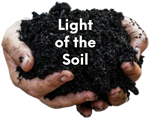Editorial Response from Light of the Soil, LLC
Subject: Utilizing Worm Castings and Compost Teas to Combat Common Plant Ailments
Worm castings (vermicompost) and compost teas are organic amendments renowned for enhancing soil health and plant vitality. Beyond their nutritional benefits, these amendments play a pivotal role in suppressing various plant diseases. Below is an overview of common plant ailments and how worm castings and compost teas can mitigate them.Food Revolution Network+2Cornell Chronicle+2SARE+2
Common Plant Diseases and Organic Remedies:
- Damping-Off Disease:
- Pathogens Involved: Primarily caused by fungi such as Pythium, Rhizoctonia, and Fusarium species.
- Symptoms: Seedlings exhibit stem rot at the soil line, leading to collapse and death.
- Organic Intervention: Application of compost teas has shown inhibitory effects on pathogens like Pythium debaryanum, reducing the incidence of damping-off. Wikipedia
- Root Rot:
- Pathogens Involved: Fungi such as Phytophthora and Fusarium species.
- Symptoms: Wilting, yellowing leaves, and decayed roots.
- Organic Intervention: Incorporating vermicompost into the soil enhances microbial diversity, which competes with and suppresses root rot pathogens. Cornell Chronicle
- Powdery Mildew:
- Pathogens Involved: Various Erysiphales fungi.
- Symptoms: White, powdery fungal growth on leaves and stems.
- Organic Intervention: Foliar applications of compost tea introduce beneficial microorganisms that outcompete powdery mildew fungi, reducing infection rates.
- Leaf Spot Diseases:
- Pathogens Involved: Fungi such as Alternaria and Septoria species.
- Symptoms: Dark, necrotic spots on foliage, leading to premature leaf drop.
- Organic Intervention: Regular use of compost teas can suppress foliar pathogens responsible for leaf spots by enhancing the plant's microbial shield. Wikipedia
- Blight Diseases:
- Pathogens Involved: Phytophthora infestans (late blight) and Alternaria solani (early blight).
- Symptoms: Lesions on leaves, stems, and fruits, leading to plant decline.
- Organic Intervention: Soil amendments with worm castings improve plant vigor and resistance, while compost teas provide beneficial microbes that antagonize blight pathogens.
Mechanisms of Disease Suppression:
- Enhanced Microbial Activity: Both worm castings and compost teas introduce beneficial microorganisms into the soil and on plant surfaces. These microbes compete with pathogens for resources and space, effectively suppressing disease-causing organisms.
- Induced Systemic Resistance: The presence of specific microbes in vermicompost and compost teas can trigger plants' natural defense mechanisms, making them more resilient to pathogen attacks. Cornell Chronicle
- Nutrient Availability: Worm castings are rich in essential nutrients and humic acids, promoting robust plant growth and strengthening plants' ability to withstand diseases. Marshall University
Recommendations for Application:
- Soil Amendment: Incorporate worm castings into garden beds or potting mixes at a ratio of 10-20% by volume to enhance soil health and disease resistance.
- Compost Tea Preparation: Brew compost tea by steeping quality compost or vermicompost in water with aeration for 24-48 hours. Apply as a foliar spray or soil drench to introduce beneficial microbes. California State University, Chico
Conclusion:
Integrating worm castings and compost teas into gardening practices offers a natural and effective approach to managing plant diseases. These organic amendments not only suppress pathogens but also enhance overall plant health, contributing to sustainable and resilient garden ecosystems.
For more information on sustainable soil management practices and the benefits of organic amendments, please visit our website or contact our team directly.

